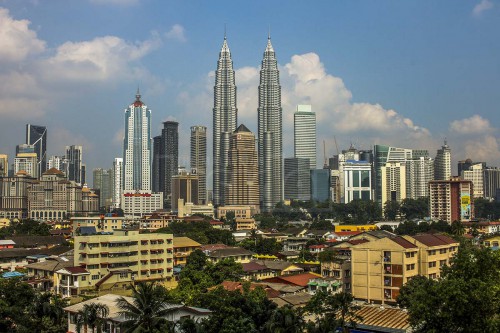Malaysia’s property market still resilient
The property market remains resilient despite the challenging economic environment. Although the number of launches and sales performance of developers have been declining, there were projects that were performing well due to the nature of the product, concept, location and marketing strategies. The market is leaning towards the affordable market segment, with creative products within the segment being well-received. According to Knight Frank in a report on the local real estate market, the outlook for the high-end condominium segment remains lacklustre, impacted by weak sentiment and a “wait-and-see” approach by buyers. Meanwhile, the office market in Klang Valley is expected to remain subdued and face downward pressure. Good grade and dual-compliant office space in good locations, however, is expected to remain resilient. (The Star Online)
Knight Frank: More sales in domestic commercial property market in 2017
Property firm Knight Frank Malaysia expects the 2017 commercial property market to see more sales activity with vendors having more realistic expectations and purchasers looking for bargains. Transactions of commercial and investment properties are anticipated to be priced between 10% to 20% below their perceived market value with realistic and increased yields. However, for residential properties, the segment is likely to continue the weak performance in 2017, reflected by a mixture of cooling measures and disappointing economic performance. Developers will face lower demand, whilst implementing strategies to attract and improve sales to counteract the lower consumer demand. The softer industry performance in Southeast Asian cities are attributed to reliance on commodities, banking and finance, oil and gas, and shipping which have a knock-on impact on commercial property. (Malaysia Outlook)
Property owners enjoying MRT windfall
The completion of the Sungai Buloh-Kajang (SBK) MRT Line is a windfall for property owners in the vicinity of its stations, with the value of properties in the area going up by 10% to 30%. The MRT project had given a drastic effect on the value of property, especially those located within a kilometre radius of the MRT stations. It gave investors the edge and room to carry out big projects, such as transit oriented development projects that would provide facilities for the public to use the service. The SBK MRT Line is expected to be fully operational by July. (Malay Mail Online)
Sarawak’s new housing policy likely to spur affordable housing growth
The Sarawak Planning Authority has recently approved the increase of development density from eight to 10 units per acre for landed housing and 24 to 30 units per acre for stratified housing. The state policy is expected to spur the construction of more affordable housing as a feasible option for private developers. Despite the slowdown in the property market, afforable housing remained in demand and would do well, given a reasonable decent location and type of house. PRIMA was mooted to provide housing priced below RM400,000 to capture a segment of the population’s need for housing.. (The Star Online)
Sheda calls on banks to adjust lending guidelines
Sarawak Housing and Real Estate Developers Association (Sheda) Kuching branch advisor Sim Kiang Chiok noted that the Malaysian economy was still resilient in view of external challenges. In property, the outlook for private developers in Sarawak is challenging due to factors such as the lack of support from financial institutions, and also government’s policy and programmes. However, banks and financial institutions are being very strict in end-financing of properties, which affects the sales of houses. He proposed for the lending for properties to be considered as savings instead of spending, adding that with the protections already in place in Malaysia, properties would appreciate instead of depreciate. He also suggested that banks consider lending on staggered repayment or longer replayment periods such as two generational loans to family housing loans. (The Borneo Post)
Scientex to develop mixed development in Johor
Scientex Bhd is acquiring two parcels of land measuring 121.2 acres in Kulai, Johor for RM123.64mil, where it plans to undertake a mixed property development. The land is located along the North-South Highway (south bound) and Senai Highway, to the south of Taman Aman Senai, Johor. On the project to be developed on the land, Scientex said it was currently too preliminary to determine the exact total gross development value, development cost, the expected starting and completion dates of the development and the expected profits to be derived from the development. (The Star Online)
KIP REIT to list in Malaysia with five retail properties
KIP REIT is set to list in Malaysia on 6 February 2017, with an initial portfolio of five retail properties across the peninsular. There will be an initial public offering (IPO) of 234.15 million units, of which 13.5 million units are open to retail investors. KIP REIT is sponsored by Malaysian property developer Kepong Industrial Park (KIP) Group.The constituents of its initial portfolio are namely the KIP Mart outlets in Tampoi, Kota Tinggi, Masai, Melaka, Bangi, and Senawang, valued at MYR580 million. (REITSWeek)
 Ban on plastic bags off to a good start despite complaints
Ban on plastic bags off to a good start despite complaints
The ban on polystyrene food containers and free plastic bags in Selangor and the Federal Territories got off to a smooth start on Jan 1, despite some shoppers being annoyed by it. Previously, Selangor held a “No Plastic Day” every Saturday but the campaign was extended to seven days a week. Shoppers in Selangor can still get single-use plastic bags from stores at 20 sen each. Perak and Johor have also announced that they would ban the use of polystyrene containers and plastic bags from June. (The Star Online)





